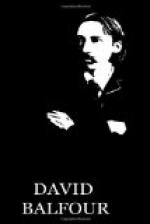As soon as we appeared, they cast off all disguise upon the other side; and the seamen pursued us with shouts and view-hullohs. We had a start of some two hundred yards, and they were but bandy-legged tarpaulins after all, that could not hope to better us at such an exercise. I suppose they were armed, but did not care to use their pistols on French ground. And as soon as I perceived that we not only held our advantage but drew a little away, I began to feel quite easy of the issue. For all which, it was a hot, brisk bit of work, so long as it lasted; Dunkirk was still far off; and when we popped over a knowe, and found a company of the garrison marching on the other side on some manoeuvre, I could very well understand the word that Alan had.
He stopped running at once; and mopping at his brow, “They’re a real bonny folk, the French nation,” says he.
* * * * *
CONCLUSION
No sooner were we safe within the walls of Dunkirk than we held a very necessary council-of-war on our position. We had taken a daughter from her father at the sword’s point; any judge would give her back to him at once, and by all likelihood clap me and Alan into jail; and though we had an argument upon our side in Captain Palisser’s letter, neither Catriona nor I were very keen to be using it in public. Upon all accounts it seemed the most prudent to carry the girl to Paris to the hands of her own chieftain, Macgregor of Bohaldie, who would be very willing to help his kinswoman, on the one hand, and not at all anxious to dishonour James upon the other.
We made but a slow journey of it up, for Catriona was not so good at the riding as the running, and had scarce sat in a saddle since the ’Forty-five. But we made it out at last, reached Paris early of a Sabbath morning, and made all speed, under Alan’s guidance, to find Bohaldie. He was finely lodged, and lived in a good style, having a pension in the Scots Fund, as well as private means; greeted Catriona like one of his own house, and seemed altogether very civil and discreet, but not particularly open. We asked of the news of James More. “Poor James!” said he, and shook his head and smiled, so that I thought he knew further than he meant to tell. Then we showed him Palisser’s letter, and he drew a long face at that.
“Poor James!” said he again. “Well, there are worse folk than James More, too. But this is dreadful bad. Tut, tut, he must have forgot himself entirely! This is a most undesirable letter. But, for all that, gentlemen, I cannot see what we would want to make it public for. It’s an ill bird that fouls his own nest, and we are all Scots folk and all Hieland.”
Upon this we were all agreed, save perhaps Alan; and still more upon the question of our marriage, which Bohaldie took in his own hands, as though there had been no such person as James More, and gave Catriona away with very pretty manners and agreeable compliments in French. It was not till all was over, and our healths drunk, that he told us James was in that city, whither he had preceded us some days, and where he now lay sick, and like to die. I thought I saw by my wife’s face what way her inclination pointed.




